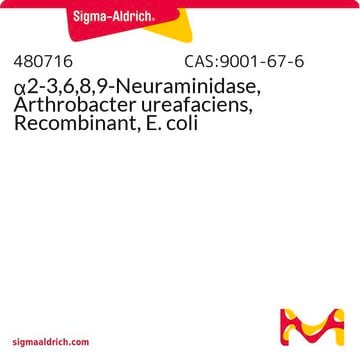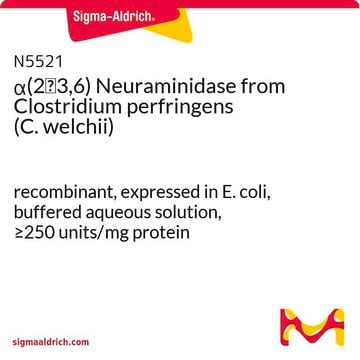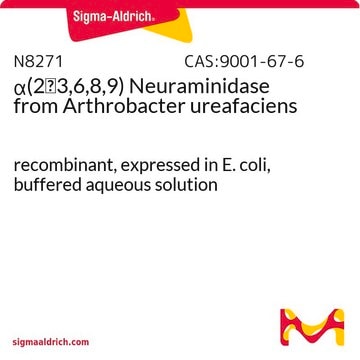480708
α2-3,6-Neuraminidase, Clostridium perfringens, Recombinant, E. coli
Synonym(s):
α2-3,6-Neuraminidase, Clostridium perfringens, Recombinant, E. coli, Acetylneuraminyl Hydrolase, Sialidase
About This Item
Recommended Products
recombinant
expressed in E. coli
Quality Level
product line
EMPROVE® EXPERT
form
liquid
specific activity
≥10 units/mL
≥250 units/mg protein
manufacturer/tradename
Calbiochem®
storage condition
do not freeze
foreign activity
N-acetylglucosaminidase, α-fucosidase, α- and β-galactosidase, α- and β-mannosidase, proteases, none detected
shipped in
wet ice
storage temp.
2-8°C
General description
Application
Warning
Unit Definition
Physical form
Other Notes
Dwek, R.A., et al. 1993. Annu. Rev. Biochem. 62, 65.
Ohta, Y., et al. 1989. J. Biochem (Tokyo) 106, 1086.
Legal Information
Signal Word
Warning
Hazard Statements
Precautionary Statements
Hazard Classifications
Eye Irrit. 2 - Met. Corr. 1 - Skin Irrit. 2 - STOT SE 3
Target Organs
Respiratory system
Storage Class Code
8B - Non-combustible, corrosive hazardous materials
WGK
WGK 1
Flash Point(F)
Not applicable
Flash Point(C)
Not applicable
Regulatory Listings
Regulatory Listings are mainly provided for chemical products. Only limited information can be provided here for non-chemical products. No entry means none of the components are listed. It is the user’s obligation to ensure the safe and legal use of the product.
PDSCL
Deleterious substance
ISHL Indicated Name
Substances Subject to be Indicated Names
ISHL Notified Names
Substances Subject to be Notified Names
Certificates of Analysis (COA)
Search for Certificates of Analysis (COA) by entering the products Lot/Batch Number. Lot and Batch Numbers can be found on a product’s label following the words ‘Lot’ or ‘Batch’.
Already Own This Product?
Find documentation for the products that you have recently purchased in the Document Library.
Customers Also Viewed
Our team of scientists has experience in all areas of research including Life Science, Material Science, Chemical Synthesis, Chromatography, Analytical and many others.
Contact Technical Service







